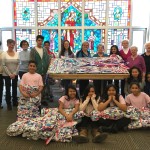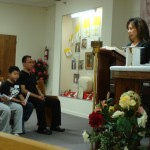Wisdom 11:22-12:2
A couple of weeks ago someone sent me an e mail with an attachment titled,” A Fascinating Zoom In”. It was produced by NASA and we are invited to travel with NASA from the biggest to the smallest distances in the universe.
Our journey starts 10 million light years away in vast expanse of space. We work our way down through the light years into our own galaxy of the Milky Way. We journey 100 light years, then 10 light years and finally at 1 light year we catch sight of our sun. At 100 billion km we begin to see our solar system, at 10 billion km we see our solar system and at 100,000 km we see planet earth, much at the first astronaughts saw it. At 1000 km we zero in on Florida, at 10 km we can make out streets and lakes – and golf courses – at 100 km we can see what we might see from a helicopter – at 10 cm we see leaves on a tree – at 1 cm we see the structure of a leaf – at 100 microns we see the cells that make up the leaf and at 1 micron we can see the cell itself. We continue the journey, at 1000 angstroms we see the chromosomes of the cell and at 100 angstroms we see the DNA chain of the leaf. At 1 nanometre we see the atom of carbon, the basis of all life and at 10 picometres we see the atom orbit of the electrons and at 100 fermi we see the inner anaton. At one Fermi we see the surface of the neutron and our journey which started in the outer reaches of space ends at 100 atom metres where we see the quark.
To tell you the truth I don’t understand any of these terms and in a way the whole things sounds like the Negro spiritual, ‘your toe bone’s connected to your foot bone and your foot bone’s connected to your ankle bone’… and so on.
To watch this ‘fascinating zoom in’ is awesome. The author of our first reading had no such insight into cosmology as we have today but he could still look to an unpolluted sky and marvel at it all. Yet he knew that compared to the awesomeness of God the wonder before his eyes was like a speck that tips the scales, like a drop of morning dew that falls to the ground. He would say this not to belittle creation but just to keep things in perspective.
In the 4th century the church condemned a heresy called Manichaeism which taught that creation was divided into good and evil, light and darkness and the material creation was evil. In condemning this world view the church echoed the words of today’s first reading, “Lord you love all things that exist and detest none of the things you have made.” In other words all creation is good and all creation from the quark to the galaxy is loved by God.
Today we’ve come to know that all creation is connected, inter-related. No being, especially the human being stands alone, apart from other human beings apart from the rest of God’s good creation. We are one living body and when one part of the body suffers, we all suffer. We can see this as we witness the diminishment of planet earth. As I’ve mentioned before, we did not weave the web of life, we are a strand in the web and what we do to the web we do to ourselves. The earth does not belong to us; we belong to the earth and what we do to the earth we do to ourselves.
There’s not a day goes by that we don’t hear of some weather disaster or environmental crisis, glaciers melting, deserts spreading. It’s depressing. We can’t pray for a healing of the earth, we are the healers. In our own little way we can make a difference as we examine our own life styles, our consumerism, our buying habits, our trashing.
Planet earth will survive. This is not the first crisis it has had to deal with in its 5 billion years of existence and we will survive as well if we can just catch the truth of our first reading -Lord, you love all things that exist, you spare all things for they are yours, you who love the living.
As we continue to celebrate this Eucharist we can pray for ourselves and for each other that we be blessed with a deeper reverence and respect for all God’s creation, that we celebrate its wonder and appreciate its fragility.
 Founded by St. Paul of the Cross, every Passionist takes a special vow to spend his or her energies in promoting remembrance of the sufferings of Jesus, the memory of the Cross, and reflection of the meaning of the Cross for the world.
Founded by St. Paul of the Cross, every Passionist takes a special vow to spend his or her energies in promoting remembrance of the sufferings of Jesus, the memory of the Cross, and reflection of the meaning of the Cross for the world.




